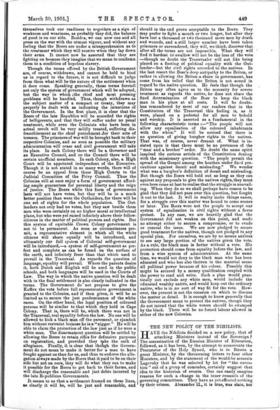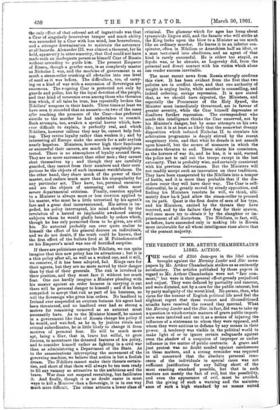THE NEW POLICY OF THE NIHILISTS.
HAVE the Nihilists decided on a new policy, that of attacking Ministers instead of the Sovereign ? The assassination of the Russian Minister of Education, followed, as it has been, by the attempt to assassinate the Procurator of the Holy Synod, who is in Russia a great Minister, by the threatening letters to four other Ministers, and by the statement of the would-be assassin Lagovsky that he was selected by lot for "the execu- tion" out of a group of comrades, certainly suggest that idea to the historian of events. One can easily imagine reasons for such a change in the inner counsels of the governing committees. They have as yet effected nothing by their crimes. Alexander IL, it is true, was slain, but the only effect of that colossal act of ingratitude was that a Czar of singularly benevolent temper and much ability was succeeded by a Czar with less mind, less benevolence, and a stronger determination to maintain the autocracy at all hazards. Alexander III. was almost a theocrat, for he held, apparently in utter sincerity, that God could not have made such an inadequate person as himself Czar of Russia without intending to guide him. The present Emperor of Russia, though a gentler man, is as completely master as Nicholas I. was, and the machine of government is as much a steam-roller crushing all obstacles into one level of sand as it was before. The difficulties, too, of carry- ing on a kind of war with a succession of Sovereigns are enormous. The reigning Czar is protected not only by guards and police, but by the loyal devotion of the people, and that kind of reverence even among those who threaten him which, if all tales be true, has repeatedly broken the Nihilists' weapons in their hands. Three times at least we have seen it recorded that an assassin—in two of the cases after reaching the presence of the Czar—has preferred suicide to the murder he had undertaken to commit. Such attempts, too, awaken a special horror which, how- ever difficult to explain, is perfectly real, and which Nihilists, however callous they may be, cannot help feel- ing. They revive loyalty rather than weaken it ; and by interesting all Europe make the search for a safe asylum nearly hopeless. Ministers, however high their functions or successful their careers, are much less completely pro- tected. There is no atmosphere of loyalty around them. They are no more sacrosanct than other men ; they cannot shut themselves up ; and though they are carefully guarded, they cannot from their numbers and their occu- pations be the objects of such incessant watchfulness. On the other hand, they share much of the power of their master, and endure much more than his unpopularity for any particular act. They have, too, personal enemies ; and are the objects of unceasing and often most severe departmental criticism. Finally, coercion applied to a Minister is always more or less coercion applied to his master, who must be a little terrorised by his agent's fate and a great deal inconvenienced. His action is im- peded, his policy interrupted, his mind shocked by the revelation of a hatred so implacable awakened among subjects whom he would gladly benefit by orders which, though he has only permitted them to be given, are still his. No autocrat probably can ever quite realise to himself the effect of his general decrees on individuals, and we do not doubt, if the truth could be known, that the first effect of the bullets fired at M Pobiedonostzeff on his Emperor's mind was one of horrified surprise.
If there are politicians among the Nihilists, we can quite imagine that this new policy has its attractions ; but it is a. thin policy after all, as well as a wicked one, and it will, we conceive, if it has been adopted, fail. Kings care for their agents, but they are no more moved by their danger than by that of their generals. The risk is involved in their position, and they must face it without too much fear. One can hardly imagine a Minister pleading with his master against an order because in carrying it out there will be personal danger to himself ; and if he feels compelled to accept that risk as part of his business, so will the Sovereign who gives him orders. No landlord in Ireland ever suspended an eviction because his agent had been threatened, and no landlord ever had so strong a motive for remaining unmoved as an autocrat must necessarily have. As to the Minister himself, he cannot in a government like that of Russia change his policy if he would, and watched, as he is, by jealous rivals and critical subordinates, he is little likely to change it from motives of personal fear. He will be much more apt, being a Slav, that is, brave but wilful, to grow furious, to accentuate the detested features of his policy, and to consider himself rather as fighting in a civil war than as administering a Department of the State. As to the assassinations interrupting the movement of the governing machine, we believe that notion is but a foolish dream. The Nihilists cannot make their threats certain- ties, and short of that there will always bo ten men ready to fill any vacancy so attractive to the ambitious and the brave. War does not suspend recruiting, but facilitates it. And finally, though it is no doubt easier in most ways to kill a Minister than a Sovereign, it is in one way much more difficult. The crime attracts a lower class of criminal. The glamour which for ages has hung about tyrannicide lingers still, and the fanatic who will strike at the King looks upon the blow to a Minister as too much like an ordinary murder. He leaves it to an inferior con- spirator, often in Nihilism or Anarchism half an idiot, or a man terrorised into obedience, and an agent of that kind is rarely successful. He is either too stupid, as Sipa° was or he shrinks, as Lagovsky did, from the personal and direct contact with his victim which alone can render success inevitable.
The most recent news from Russia strongly confirms this view. It has been evident from the first that two policies are in conflict there, and that one authority of weight is urging lenity, while another is counselling, and indeed ordering, savage repression. It is now stated that, as we should have expected, the Ministers, and especially the Procurator of the Holy Synod, the Minister most immediately threatened, are in favour of greater severity, while the Czar himself deprecates or disallows further repression. The correspondent who sends this intelligence thinks the Czar unnerved, not by his Minister's danger, but by some attempts on his own life ; but it is at least as likely that the somewhat dreamy disposition which induced Nicholas II. to circulate his arbitration programme is deeply stirred by the recent sanguinary riots, and that what he dreads is not assault upon himself, but the scenes of massacre in which the disorders threaten to end. These alarm his conscience, as the horrors of war do, and he has, it is said, warned the police not to call out the troops except in the last extremity. That is probably wise, and certainly consistent with his previous deliverances. But the Ministers will not readily accept such an innovation on their traditions. They have been exasperated by the Nihilists into a temper of battle, and it is more than probable that if the dis- orders recur they will have their way. The Czar is self- distrustful, he is greatly moved by steady opposition, and finding his Ministers resolute he will, we think, ulti- mately draw bask ;and allow the steam-roller to proceed on its path. Quiet is the first desire of men of his type, and his Ministers, excited by the threats they have received, and by the failure they fear for their system, will once more try to obtain it by the slaughter or im- prisonment of all disturbers. The Nihilists, in fact, will, as before, have succeeded only in making life in Russia more intolerable for all whose intelligence rises above that of the peasant majority.







































 Previous page
Previous page